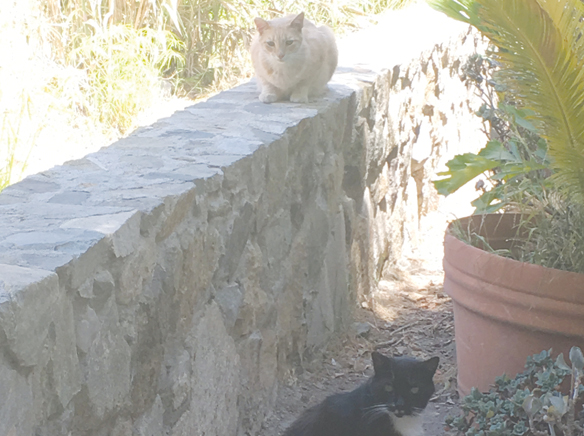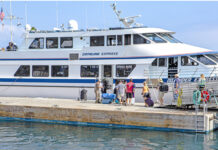
Mystery has never been a stranger to Catalina Island, but the Los Angeles Sheriff’s Department is busy investigating the most recent case of who or what is poisoning the colony cats? The investigation began Tuesday night as Mayor Anni Marshall read a letter from Diane Stone, president of the Catalina Island Humane Society, who pleaded for help.
Stone said several “colony cats” have become extremely ill or have died of late, and a local vet has determined the affected cats had all consumed antifreeze. “There are two obvious ways for cats t0ingest antifreeze,” said the letter. It said that it was possible that someone inadvertently left antifreeze near animals, or someone purposely made the “unthinkable choice” of feeding it to them “with the intent of killing the animal.”
Stone informed the Council that she “would like to think this is an isolated, accidental incident but we cannot be naïve and blind to the fact that this could be a conscious, malicious and illegal act.” L.A. Sheriff’s Capt. John Hocking, while making his report to the Council, asked for a copy of the letter on the spot to begin an investigation. On Wednesday, Hocking said, “if this an in intentional act, we will arrest them and recommend charges directly to the District Attorney.” Investigators spent most of the day trying to sort out the facts.
The cats that were sickened and those that died were “colony cats,” meaning they did not belong to anyone in particular, but were being fed by an Avalon woman, he said.
In all, four cats have so far been involved. The first incident began on Mother’s Day and have been occurring since.
Most of the incidents have occurred near Falls Canyon where it meets Country Club Drive. He said area is littered with abandoned cars, golf carts and other junk, so it is potential there was some antifreeze leaking, but none was found.
The city is currently trying to clean up the area, shipping the abandoned junk over town for disposal. Investigators have thus far found no “bowls of antifreeze,” said Hocking on Thursday.
Hocking said the investigation revealed that the first cat that was found dead was “buried” and therefore unclear if it had been poisoned. He said the first cat found had indications that it could have been attacked by another animal.
The second cat was found a couple of weeks later. He said the vet reported the cat was in pain, it was acting very sluggish and obviously mortally sick. The cat eventually died but since there was little suspicion at the time, no tissue samples were taken, Hocking said.
However, when it happened again to another of the colony cats, it showed the same symptoms and eventually died, Dr. Richard Denney of the Animal Clinic of Catalina performed a cat autopsy (necropsy) using tissue samples that reportedly confirmed the antifreeze findings, said Hocking.
Since then, a fourth cat has been found “showing the same symptoms” but is being treated by Dr. Denney and is recovering,” said Hocking.
“This is very early in the investigation,” Hocking said Thursday. Investigators cannot say the cats were poisoned and they cannot rule it out.
The top law enforcement official on the island said he is curious as to who may use antifreeze on the island, since it is a tropical climate, but that he has found some businesses that do. “It could be accidental, but we’re just not sure yet.”
Whatever is causing the death of the cats, purposeful or accidental, Hocking said it needs to be prevented so that it does not spread to other species like deer or foxes.
The investigation will continue, he said, and if the Sheriff’s department determines the cats were intentionally poisoned, those found responsible will be charged with “cruelty to animals involving death,” which he said is “a very serious charge.”










